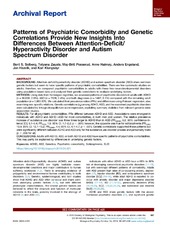Patterns of psychiatric comorbidity and genetic correlations provide new insights into differences between attention-deficit/hyperactivity disorder and autism spectrum disorder
Solberg, Berit Skretting; Zayats, Tetyana; Posserud, Maj-Britt Rocio; Halmøy, Anne; Engeland, Anders; Haavik, Jan; Klungsøyr, Kari
Peer reviewed, Journal article
Published version

Åpne
Permanent lenke
https://hdl.handle.net/1956/20697Utgivelsesdato
2019-04-28Metadata
Vis full innførselSamlinger
Originalversjon
https://doi.org/10.1016/j.biopsych.2019.04.021Sammendrag
Background Attention-deficit/hyperactivity disorder (ADHD) and autism spectrum disorder (ASD) share common genetic factors but seem to have specific patterns of psychiatric comorbidities. There are few systematic studies on adults; therefore, we compared psychiatric comorbidities in adults with these two neurodevelopmental disorders using population-based data and analyzed their genetic correlations to evaluate underlying factors. Methods Using data from Norwegian registries, we assessed patterns of psychiatric disorders in adults with ADHD (n = 38,636; 2.3%), ASD (n = 7528; 0.4%), and both diagnoses (n = 1467; 0.1%) compared with the remaining adult population (n = 1,653,575). We calculated their prevalence ratios (PRs) and differences using Poisson regression, also examining sex-specific relations. Genetic correlations (rg) among ADHD, ASD, and the examined psychiatric disorders were calculated by linkage disequilibrium score regression, exploiting summary statistics from relevant genome-wide association studies. Results For all psychiatric comorbidities, PRs differed between ADHD and ASD. Associations were strongest in individuals with ADHD and ADHD+ASD for most comorbidities, in both men and women. The relative prevalence increase of substance use disorder was three times larger in ADHD than in ASD (PRADHD, 6.2; 95% confidence interval [CI], 6.1–6.4; PRASD, 1.9; 95% CI, 1.7–2.2; p < .001); however, the opposite was true for schizophrenia (PRASD, 13.9; 95% CI, 12.7–15.2; PRADHD, 4.4; 95% CI, 4.1–4.7; p < .001). Genetic correlations supported these patterns but were significantly different between ADHD and ASD only for the substance use disorder proxies and personality traits (p < .006 for all). Conclusions Adults with ADHD, ASD, or both ADHD and ASD have specific patterns of psychiatric comorbidities. This may partly be explained by differences in underlying genetic factors. Keywords ADHDASDGeneticsPsychiatric comorbiditySchizophreniaSUD Attention-deficit/hyperactivity disorder (ADHD) and autism spectrum disorder (ASD) are highly heritable neurodevelopmental conditions and major contributors to human suffering worldwide 1, 2. There is emerging evidence of polygenicity and environmental factors contributing to both disorders 3, 4. Genetic, epidemiological, and twin studies show that ADHD and ASD often co-occur and share common underlying genetic factors 5, 6, 7, 8, but with different phenotypic characteristics. The shared genetic factors are believed to affect the structure and function of molecular networks in the brain, possibly involved in the etiology of ADHD (9) and ASD (10). Individuals with either ADHD or ASD have a 65% to 90% risk of developing concomitant psychiatric disorders 11, 12, 13, but with seemingly different patterns of comorbidity. Adults with ASD present high rates of co-occurring anxiety, depression (13), bipolar disorder (BD), and schizophrenia spectrum disorder (SCZ) 14, 15, 16, while adult ADHD is reported to co-occur with anxiety disorder and major depressive disorder (MDD) 17, 18, 19, BD 11, 19, 20, 21, 22, personality disorders (PDs) 18, 19, 23, SCZ, 19, 22, 24, 25, and substance use disorder (SUD) 19, 20, 26. ADHD and ASD share genetic factors with the above-mentioned psychiatric disorders (27), and significant genetic correlations between different phenotype-specific traits for ADHD and ASD have been demonstrated (28). Nonetheless, except for a couple of small clinical studies, patterns of psychiatric comorbidities have not been systematically compared between adults with ASD or ADHD 29, 30. Further, previous studies have reported that children with both ADHD and ASD may have more severe impairments than those with ASD alone; however, comparable studies in adults are lacking 31, 32. Only one single population-based study has directly compared individuals with ADHD alone, ASD alone, or both ADHD and ASD with unaffected individuals, but this was in a population too young to be diagnosed with adult-onset psychiatric disorders (33). We aimed at evaluating similarities and differences in psychiatric comorbidity between ADHD and ASD in adulthood, both clinically and genetically. Therefore, we compared the prevalence of psychiatric disorders in adults with ADHD alone, ASD alone, and both ADHD and ASD with adults without ADHD or ASD and supplemented these analyses with the estimation of genetic correlations between the studied disorders.
